US sanctions not to impede Iran-India trade
 “India is among Iran’s top five trading partners and would not give in easily to US sanctions,” Parham Rezaei told Iran Daily, adding that India is seeking ways to sidestep US oil and banking sanctions against Iran.
“India is among Iran’s top five trading partners and would not give in easily to US sanctions,” Parham Rezaei told Iran Daily, adding that India is seeking ways to sidestep US oil and banking sanctions against Iran.
The Indian government has come to ‘some agreements’ with the US to get the waivers it needs, he said, without delving into the details of such accords.
“As a result, India will continue to buy oil from Iran, even after the second round of (US) sanctions against Iran,’” Rezaei added.
Last week Reuters reported that India will buy nine million barrels of Iranian oil in November, indicating the world’s third-biggest oil importer will continue purchasing crude from the Islamic Republic despite US sanctions coming into force on November 4.
The United States plans to impose fresh sanctions targeting Iran’s oil sector on November 4 after Washington unilaterally withdrew from the 2015 Iran nuclear deal, formally known as the Joint Comprehensive Plan of Action (JCPOA).
Rezaei said Iran’s exports to India stand at $13 billion a year, of which $11 billion pertains to oil while non-oil exports amount to $2 billion.
Elaborating the non-oil trade between the two countries, he said, Iran’s non-oil exports to India last year stood at $1.78 billion while Iran imported goods worth $1.54 billion in the same period.
A total of 2.28 million tons of goods worth $611 million were exported to India during the period, while India’s import to Iran hit 381 million tons valued at $538 million, the official added.
Rezaei said Iran and India have always enjoyed good trading relationship, adding that many Indian firms have kept up their activities with Tehran, with Indian business delegations being sent to Iran despite the US tightening its sanctions against the Islamic Republic.
Iran’s main non-oil exports to India include steel, ammonia, gas condensates, petrochemicals and paraffin. India’s main exports to Iran include agricultural products such as rice, oil seeds, cotton, tea as well as textiles, thread, and industrial machinery.
Rezaei said the two sides have already experienced the state of affairs similar to the one expected to come in force in November where Tehran and Delhi conducted banking transactions in national currencies.
He added that an Iranian bank will soon register a branch in India to facilitate transactions between the two sides under US sanctions.
“The permission to register a branch of Bank Pasargad has been granted, and the Indian government has also agreed (with this). Preparations are underway for launching a branch of this bank in India,” Rezaei said.
He added, “Registering an Iranian bank in India can facilitate financial transactions. However, in case there were no branches of Iranian bank in India, private traders could still find ways to conduct businesses.”
Pointing to Iran-India trades before the implementation of JCPOA, the official said that the two sides never conducted trades using the barter mechanism. “Iran’s revenue would have been deposited into (an account in) UCO bank and then withdrawals could be made depending on the other side’s commitments.”
He also said Iran’s revenues from oil exports before 2015 were remitted using Indian rupee and after the implementation of the JCPOA the remittances were made in dollar and rupee.
“Probably after the imposition of second round of (US) sanctions the two sides would switch back to the previous system (of using rupee),” Rezaei said.
Rezaei described India as a leading country in the field of Information Technology (IT) and computer hardware, adding that the two sides have some joint projects in this field.
Chabahar port
Rezaei said India is interested in investing in Chabahar port in southeastern Iran as the project provides India with an exceptional transit route.
In May 2016, India, Iran and Afghanistan signed a pact that entailed the establishment of Transit and Transport Corridor among the three countries using Chabahar port as one of the regional hubs for sea transportation in Iran, besides the multimodal transport of goods and passengers across the three nations.
India plans to develop Chabahar port, which would give it access to landlocked Afghanistan and energy-rich Central Asia through its Jawaharlal Nehru and Kandla ports on the west coast, circumventing Pakistan.
Source: Iran Daily
Message end/
